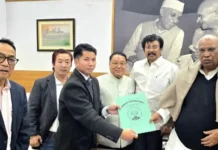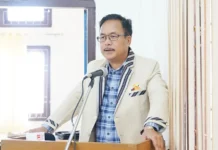ITANAGAR, 25 Feb: The Northeast regional centre (NERC) of the GB Pant National Institute of Himalayan Environment here organized a two-day state level consultation workshop in collaboration with the Arunachal Pradesh State Council for Science & Technology on 24 and 25 February for ‘identifying priority thematic areas of the state’ under the Himalayan Knowledge Network (HKN) project.
On the first day, departments concerned and academic institutions working in the state were invited to participate, whereas on the second day some of the NGOs working in the state were invited.
Altogether 35 participants from different line departments and institutions attended the workshop in the physical mode and presented their views and inputs on the outlined thematic areas on the first day. Senior officials from departments like the SIRD & PR, soil & water conservation, horticulture, town and urban planning, economics & statistics, environment & forests, Botanical Survey of India, Zoological Survey of India, Dera Natung Government College, the State Remote Sensing Application Centre, etc, participated in the workshop.
On the second day, 15 representatives of five NGOs participated virtually.
On both the days, NERC Head Mahendra Lodhi made detailed presentations on the background and objectives of the HKN project.
During the workshop, discussions on major thematic areas, such as water resources, agriculture, forestry/forest resources, biodiversity, rural development, infrastructure developmental, climate change, etc, and related issues were held.
Water resources development, specifically natural springs, was identified as the top priority for the state as the state is facing rapid depletion of these natural springs in the uphill areas. The lack of reliable or authentic data, inaccessibility of available data, etc, were the common issues or gap areas related to almost all the thematic areas.
Experts suggested that research and development activities be made more people-centric. Most of the experts stressed on developing a spring atlas for the state.
Forest resource and biodiversity were identified as other important thematic areas for the state. Regarding biodiversity, the experts expressed concern over unavailability of experienced taxonomists in the state for both flora and fauna.



